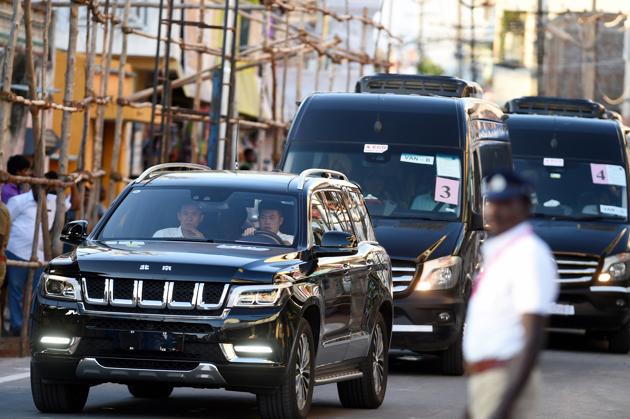Anticipation builds ahead of Xi Jinping, PM Modi meet
When Modi and Xi have their first walk near a Mamallapuram beach on Friday evening, the question is whether they will continue with the “Wuhan spirit” or whether they will first clear the air.
An air of anticipation had marked the build-up to the first informal summit between Prime Minister Narendra Modi and President Xi Jinping in the central Chinese city of Wuhan in April 2018.

Late external affairs minister Sushma Swaraj and her Chinese counterpart Wang Yi jointly announced the summit in Beijing on a Sunday, striking the right notes of optimism and signalling a thaw in the chill that affected bilateral ties following the military standoff at Doklam in 2017.
A sense of positivity was discernible at the end of it, with Modi and Xi talking about keeping the border peaceful and, for the first time, deciding to start a cooperation project in a third country, Afghanistan.
About 18 months later, as Xi flies to Chennai on Friday in his plush air force aircraft for the second informal summit in the temple town of
Mamallapuram, that air of anticipation seems to have weakened just enough to include a gust of that old motif in China-India ties – distrust.
Pakistan Prime Minister Imran Khan’s sudden appearance in Beijing with the army chief, Gen Qamar Bajwa this week, for two days of packed meetings with the top Chinese leadership, didn’t really help the build-up to the “Chennai spirit”, a possible continuation of the “Wuhan spirit” – signifying a vague sort of diplomatic bonhomie.
Following Khan’s meetings, the word Kashmir was liberally used in statements issued by Islamabad and Beijing, and Xi was quoted by the official newsagency as saying that China will closely follow developments in Kashmir.
Modi had spent nearly 40 hours, including two nights in Wuhan. In contrast, Xi will possibly spend less than a day in Chennai and Mamallapuram.
So, when Modi and Xi have their first walk near a Mamallapuram beach on Friday evening, the question is whether they will continue with the “Wuhan spirit” or whether they will first clear the air over, say, recent developments in Kashmir.
That’s where the summit’s informal structure will come in handy as diplomats from the two countries point out at every opportunity: The two leaders will meet in a relaxed, friendly atmosphere with no pressure of having to come out with a structured document at the end of it all.
They, instead, need to give “strategic guidance” for the broad direction of bilateral ties. Their broad “talking points” are pretty much clear: border, trade, people-to-people exchanges and regional connectivity.
The nature of the mechanism, however, could be unpredictable. It’s the unpredictability that could throw up surprises as Modi and Xi could decide to focus on a particular aspect, as they did in Wuhan when they talked about giving “strategic guidance” to their militaries.
“Informal talk is an important step in China-India relations, which provides a unique opportunity to reach consensus and look for common interests from the highest level. It is a top-down approach to transform consensus into tangible results,” said Lu Yang, an India expert from the Department of International Relations at Tsinghua University in Beijing.
The informal structure, as pointed out recently by a former Indian diplomat in Beijing, gives Modi and Xi hours of opportunity to directly interact, cutting through diplomatic protocol in relative privacy.
“The meeting of the top leaders will definitely prevent bilateral differences like Tibet, the border dispute, Pakistan, and the Belt and Road Initiative in particular from disturbing general stability in bilateral ties,” said Hu Shisheng from the China Institutes of Contemporary International Relations.
Hu added the interaction will help the two leaders reduce the possibility of misjudging or misinterpreting policies towards each other, and work on reducing the sense of geo-strategic competition in common surroundings.
“Informal talk is a long-term mechanism. We can only resolve differences through talks to enhance mutual understanding and trust,” Lu said.
On Wednesday, vice foreign minister, Luo Zhaohui talked about the “strong personal chemistry” between Modi and Xi, who have met close to 20 times since 2014.
“The informal summit is a good opportunity…to keep up the momentum and chemistry between the two leaders, focusing on bilateral cooperation and think big on the future of ties,” said Lan Jianxue from the China Institute of International Studies.
It remains to be seen whether that chemistry is able to bring back the air of bonhomie in ties at the end of the summit on Saturday.
Get Current Updates on India News, Lok Sabha Election 2024 live, Infosys Q4 Results Live, Elections 2024, Election 2024 Date along with Latest News and Top Headlines from India and around the world.



